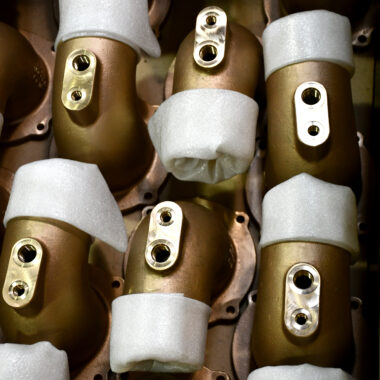Crafting Perfection: Just How to Attain High-Quality Light Weight Aluminum Castings Every Single Time
In the world of light weight aluminum casting, the pursuit of excellence is a continual journey that requires a meticulous strategy and an eager understanding of the complexities involved. Attaining constant premium aluminum spreadings demands a comprehensive understanding of the processes, from selecting the ideal alloy to carrying out accurate mold and mildew styles and meticulously regulating casting criteria. The true proficiency lies in the capacity to execute these components flawlessly to produce flawless castings every time. As we discover the details of crafting excellence in light weight aluminum spreadings, uncovering the crucial strategies and methods that lead to flawless outcomes ends up being extremely important for those pursuing quality in this specialized area.
Understanding Aluminum Casting Processes
Aluminum casting processes, important in the production market, include the complex makeover of liquified light weight aluminum right into strong kinds via a collection of carefully regulated actions. Recognizing these procedures is vital to attaining high-grade light weight aluminum spreadings constantly - about aluminum casting. The main techniques utilized in aluminum casting are die casting, sand casting, and investment casting

Each of these procedures has its benefits and is picked based upon variables like intricacy, volume, and desired finish of the aluminum casting. about aluminum casting. Understanding the complexities of these techniques is vital for suppliers intending to create top notch light weight aluminum spreadings regularly
Picking the Right Light Weight Aluminum Alloy
Choosing the ideal aluminum alloy is an essential decision in the manufacturing of top quality light weight aluminum spreadings. When choosing a light weight aluminum alloy for casting, it is necessary to consider the particular needs of the application to guarantee ideal efficiency.
One of the most generally used aluminum alloys for spreading is A356. This alloy offers outstanding castability, high toughness, and good rust resistance, making it ideal for a large range of applications. 6061 light weight aluminum alloy is preferred for its premium weldability and excellent mechanical residential or commercial properties. For applications needing high toughness, 7075 light weight aluminum alloy is a preferred choice due to its outstanding strength-to-weight proportion.
In enhancement to mechanical residential properties, factors to consider such as expense, accessibility, and post-casting procedures must likewise influence the selection of the best aluminum alloy. By thoroughly assessing these elements, producers can guarantee the production of high-quality aluminum spreadings that satisfy the preferred specs.
Executing Proper Mold Layout
Establishing an efficient mold layout is critical for making certain the effective production of high-quality light weight aluminum spreadings. Proper mold and mildew style plays a considerable role in attaining the preferred qualities of the end product. To execute an effective mold and mildew design, variables such as product flow, cooling down rates, and component geometry need to be thoroughly considered.
One secret aspect of mold and mildew design is making certain appropriate filling and solidification of the light weight aluminum within the mold dental caries. This involves making runner and gating systems that promote smooth metal circulation and protect against issues such as air entrapment or incomplete dental filling. Additionally, including cooling networks right into the mold layout helps regulate solidification rates and minimize the threat of porosity or shrinking defects.

Controlling Casting Parameters

Ensuring Post-Casting Quality Checks
To maintain the high quality of aluminum spreadings, thorough post-casting high quality checks are essential. After the spreading procedure is finished, it is essential to ensure that the final items satisfy the preferred requirements and specifications. One of the main top quality checks involves inspecting the surface coating of the castings to identify any kind of defects such as porosity, splits, or surface irregularities. This aesthetic inspection is frequently supplemented by non-destructive screening methods like ultrasonic testing or dye penetrant examination to find internal imperfections that might jeopardize the honesty of the casting.
Dimensional precision is one more crucial aspect that must be confirmed during post-casting quality checks. Measurements of key measurements and resistances need to be required to verify that the castings comply with the called for specifications. In addition, mechanical residential properties such as firmness, tensile strength, and effect resistance may need to be reviewed with product testing to make sure that the castings have the necessary stamina and resilience for their desired application.
Final Thought
To conclude, achieving high-quality light weight aluminum castings needs a comprehensive understanding of the casting procedures, choosing the appropriate alloy, designing mold and mildews properly, managing casting criteria diligently, and carrying out post-casting quality checks diligently. By adhering to these steps, manufacturers can continually create aluminum spreadings that satisfy the highest criteria of high quality and performance.
Attaining constant top quality light weight click resources aluminum castings requires a detailed grasp of the procedures, from selecting the ideal alloy to carrying out precise mold and mildew styles and diligently managing spreading parameters. The key techniques made use of in aluminum spreading are die spreading, sand casting, and financial investment casting.
Financial investment casting, likewise recognized as precision spreading, involves producing wax patterns that are covered in ceramic to develop molds.Picking the appropriate light weight aluminum alloy is a crucial choice in the production of top quality light weight aluminum castings.Making sure specific control over casting specifications is essential for preserving uniformity and top quality in light weight aluminum casting production.
Comments on “About Aluminum Casting Essentials: Every Little Thing You Need to Know”